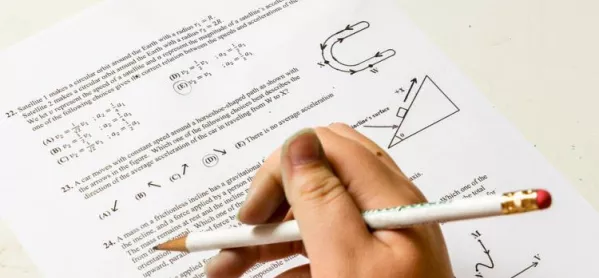We have four months until the GCSE exams, and maths revision is probably not at the forefront of many students’ minds right now.
But little and often ought to be the mantra from now on.
We know the make-up of the maths GCSE now; a few easier questions at the start before the problems burst in.
Quick read: What are the hardest GCSE subjects? A student’s view
Quick listen: Why maths A level is the ticket to a top university
Want to know more? The show hacking student phones to educate them about data
I can almost hear the conversation at examiner HQ: “What unlikely topics can we mix ratio with this year?”
These complicated questions are great, but unless our students are really, really secure with the underlying mathematics, they have as much chance of answering them as we do of getting through the next decade without another new GCSE.
One of my favourite exam questions in recent years was the infamous Hannah’s sweets, partly because it was so unexpected, given the predictability of GCSE to that point.
If I give that question to my most successful mathematicians, all the necessary component skills are in place, meaning they can think carefully about how to solve the problem without getting distracted by the mechanics of the process itself.
Fluently, in isolation, they can set up a probability tree, they can write algebraic expressions to represent unknown quantities, they can multiply and add algebraic fractions and they can solve a quadratic equation.
This means that when they have identified the string of steps needed to solve the problem, they get on with it relatively effortlessly.
GCSE maths: how to get revision right
The same illustration applies to any problem at any level of difficulty. If the underlying mathematics is effortless, the process of solving the problem is hugely simplified.
Given the pressures of exam conditions, this effect becomes all the more apparent.
When talking to my students and their parents, I compare getting good at mathematics to getting good at whatever sport or artistic endeavour they enjoy.
They need to practise over and over again for their skills to become embedded and for them to reach a level of competency - be it shooting in netball, playing a guitar riff, drawing a lifelike animal or finding missing angles in circles.
The traditional pre-exam period of revision is not a sufficiently long stretch of time for most students to reach the required fluency, especially when you add in the pressures of multiple subjects.
Combine this knowledge with what we understand from cognitive science and Ebbinghaus’ forgetting curve - which reminds us that we need to revisit what we learn periodically in order to remember it long-term - and we can see that maths revision needs to start sooner if it is to be truly effective.
It’s all well and good telling students they must start revising now, but when they have homework still to do, and new content still to learn, they may not know how to do this.
There are a few simple things you can tell students (and their parents if you want it to actually happen):
-
Little and often is the way forward. Fifteen minutes on one topic three or four times a week is not remotely onerous and is hugely beneficial. Point them to one of the many websites (such as Corbett Maths) that feature comprehensive revision lists and questions and get them to work through it.
-
Practise questions, don’t just read notes or watch videos. You only get good at maths by doing maths.
-
Make a list of the topics you’ve revised. Tick them off if you can do them without a problem. Make a note to return to them if you aren’t secure yet. Every now and then, return to your secure topics to make sure you haven’t forgotten them.
-
As the exams get closer, gradually increase your revision time. By the time you are in full revision mode, you should be doing at least four hours of maths a week, and the more the better.
Get them started now - they won’t regret it.
Jemma Sherwood is a head of maths and a National Centre for Excellence in the Teaching of Mathematics professional development lead. She tweets @jemmaths


